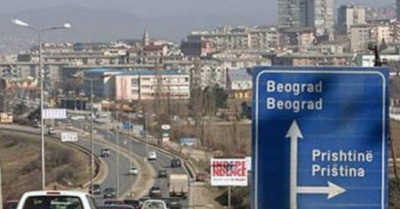EU Trying To Take Over Serbia-Kosovo Negotiations From U.S.

French Foreign Minister Jean-Yves Le Drian and German Foreign Minister Heiko Maas in a joint statement on the weekend said that EU-led dialogue between Serbia and Kosovo must restart as soon as possible and that shortcuts and quick fixes are excluded from the European plan towards a final deal. The sudden weekend request from France and Germany for the immediate continuation of dialogue between Kosovo and Serbia, under the leadership of the EU, was euphorically welcomed in Pristina, because, unlike the U.S. one, it offers no dead line for a solution. The EU does not want a repeat of the Dayton Agreement for Kosovo as it has been a catastrophic failure for Bosnia and the EU was only a passive observer when Bosnia was divided.
For Belgrade, there are several elements that it has to face. First of all, the battle between the EU and the U.S. for supremacy in leading the Kosovo process is underway. In that, the joint letter from Paris and Berlin requests dialogue between Belgrade and Pristina to begin as soon as possible but for the dialogue to be patient, while Washington is also on a diplomatic offensive with the aim to end the process as soon as possible.
The EU has been silent on this issue for a long while, which the U.S. used to activate and engage in dialogue in the absence of European influence. Knowing the traditional position of Washington on the Kosovo issue, Belgrade should prevent the U.S. from taking a lead position in any negotiations because they have always been on the side of a Kosovo independent of Serbia.
With Berlin and Paris, as the leading members of the EU, showing greater interest in resolving the issue between Serbia and Kosovo, they are showing their return to the process in a demonstration of their increased influence in the region. It is important for the Europeans to indicate in some way that they are still interested in having the main influence in the dialogue. If we observe this from Serbia’s side, this could be in its favour as the EU still has member states that do not recognize an independent Kosovo and will defend this position.
However, Pristina is also looking forward to European mediation in the process and it is not only due to the fact that they are beginning to give up on the U.S., but for the fact the Europeans are not putting pressure for the negotiations to end by a certain time frame. The U.S. wants a quick solution, while Germany and France, although they are looking for an efficient dialogue, are more inclined to a slower pace for reaching a solution and do not set deadlines. This suits Pristina at the moment because of the political crisis and disagreements between Albanian leaders on this issue. So, they need to put their own house in order before being pressured to making agreements with Serbia.
One of Belgrade’s obligations in the accession negotiations with the EU is a final solution to the Kosovo issue under the auspices of the EU. This goal of EU accession however is mostly at the behest of the Serbian political class and does not necessarily reflect the opinions of the people. None-the-less, Berlin and Paris want to say that they will not be just observers as the EU continually seeks ways to become more sovereign and independent of U.S. foreign policy.
Although Germany is rigid, it will not want a change of borders in Kosovo. However, the EU is not only Germany, as much as it wishes it to be. Europe is to formally provide a service and to serve as a mediator between Belgrade and Pristina in order to reach a legally binding agreement between Belgrade and Pristina. It would be completely normal for Europe to solve this problem, because it is on the European continent and not the North American one. However, the fact is that at this moment we actually have two negotiating parties that provide various potential solutions. Therefore, there is no doubt that the EU is seeking to take over negotiations between Serbia and Kosovo from the U.S., and it appears that both parties are happy for this to occur.
Featured image courtesy of Infobrics

